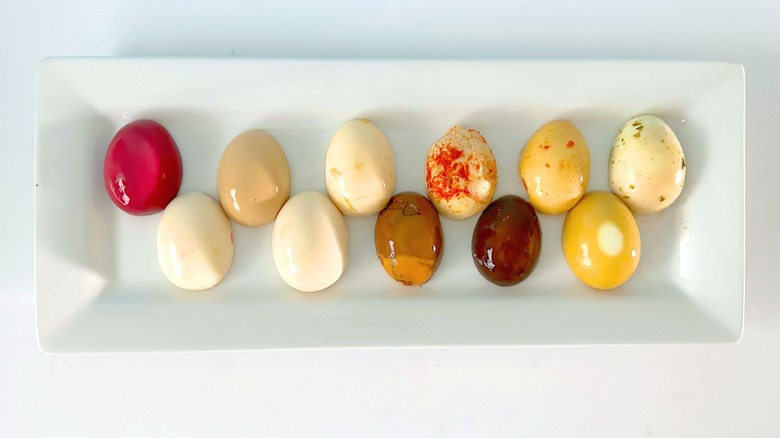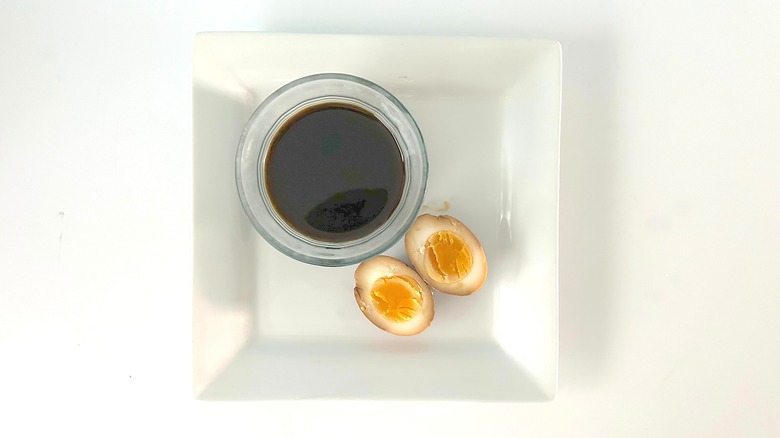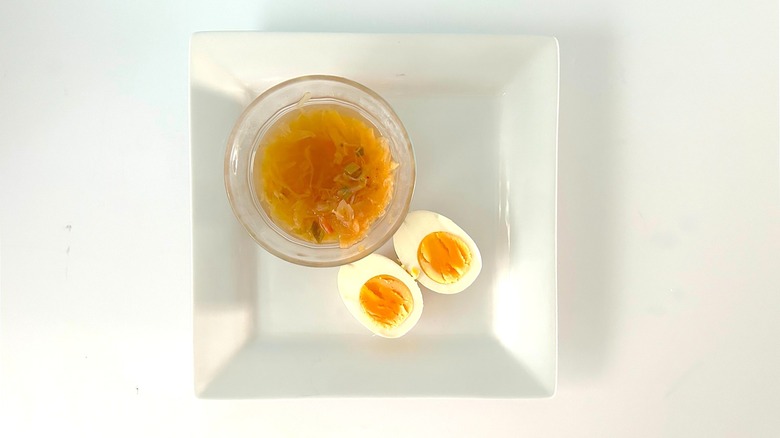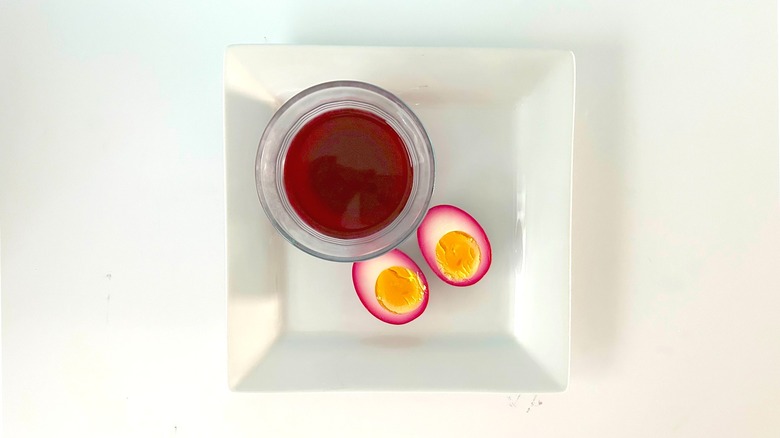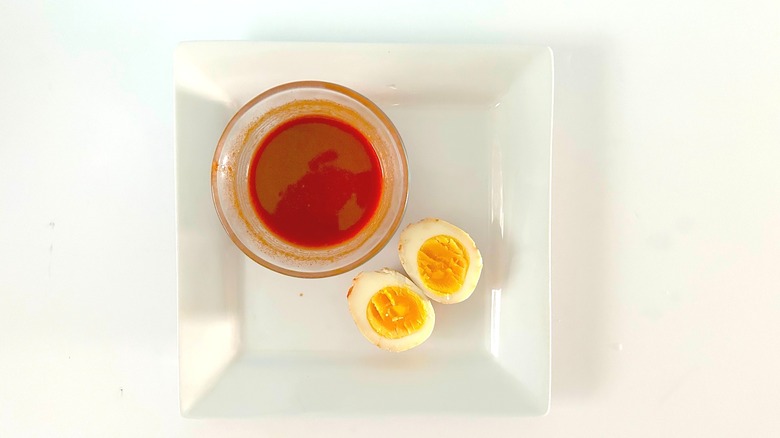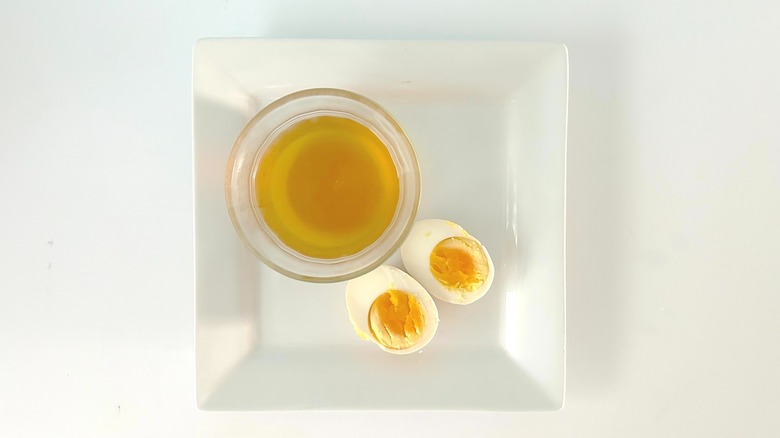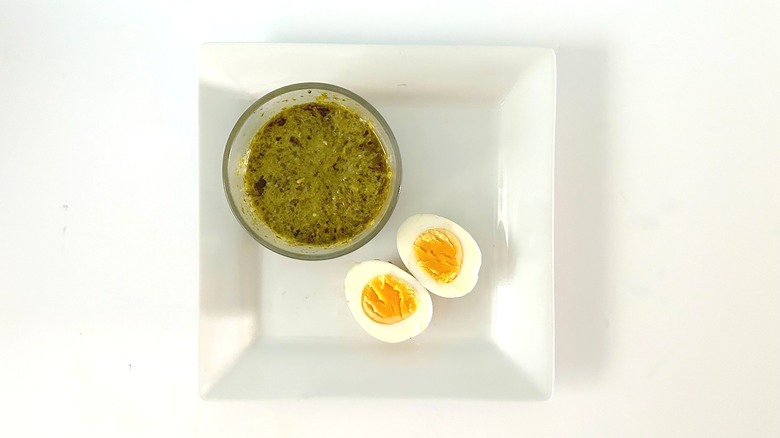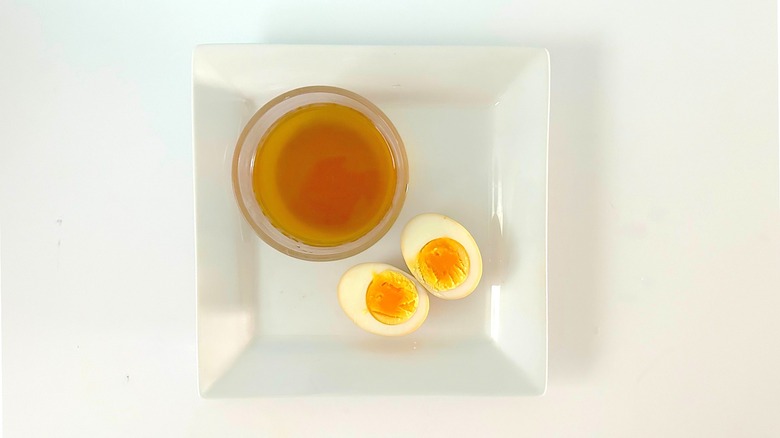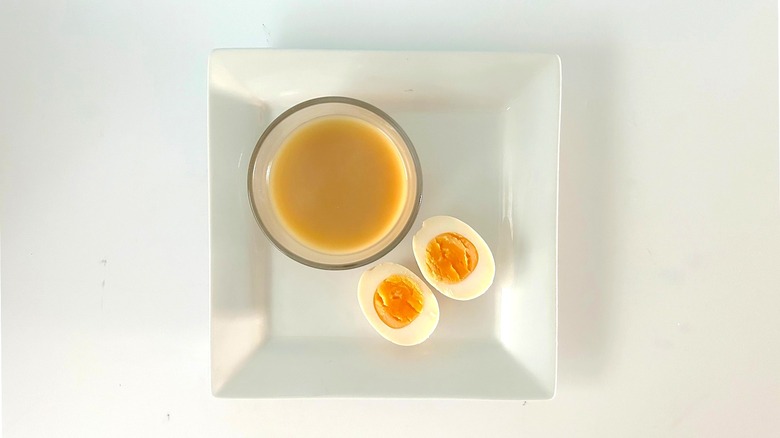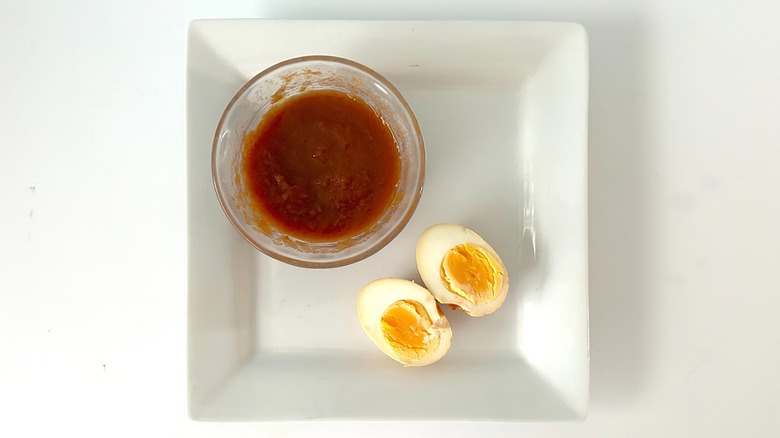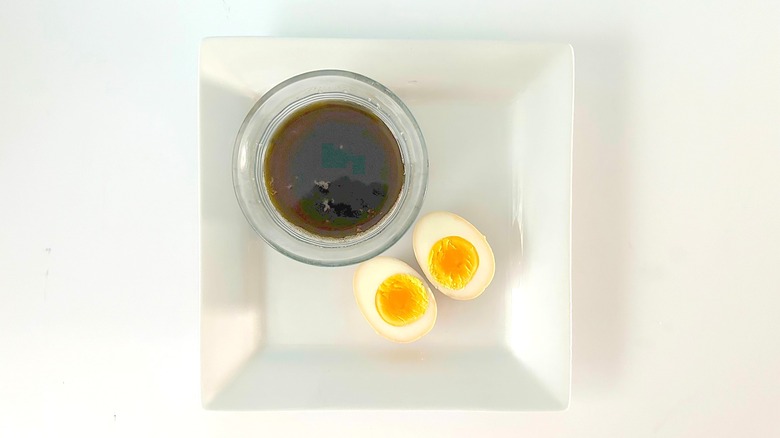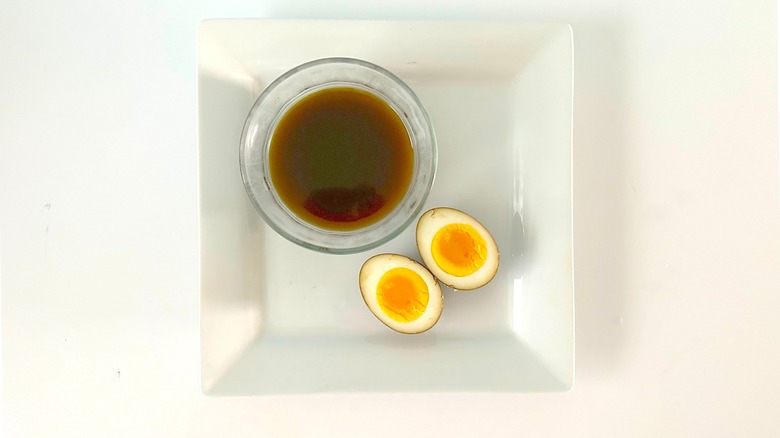11 Creative Liquids You Should Be Marinating Hard-Boiled Eggs In
As a professional chef, one of my primary jobs is to come up with ways to infuse every ingredient with flavor. Some ingredients are more receptive to this than others. One that poses a unique challenge are hard-boiled eggs. The process of perfectly hard-boiling eggs involves heating them in a liquid, usually water or broth, to denature the proteins within their yolks and whites, causing them to firm up, thereby cooking them. Though some flavor can be absorbed from the liquid by the eggs, their shells act as a kind of barrier, preventing them from taking on substantial seasonings in the limited time they spend submerged there. A better alternative to imparting hard-boiled eggs with flavor is to marinate them.
Unlike pickling, which typically involves soaking an ingredient in a brine for several weeks to help preserve it, a shorter marinade of roughly of a day or two in a liquid can help transfer a delicate flavor and a lovely color onto the hard-boiled eggs. This method makes them the perfect component of many dishes, from ramen noodles to egg salad sandwiches.
To illustrate this, I marinated hard-boiled eggs in 11 different liquids for a 24-hour period, rotating them several times during the process to ensure they absorbed the seasonings evenly. The result was nothing short of visually stunning and incredibly delicious. Read on to discover the many liquids you can use to marinate hard-boiled eggs to convert them into something that will totally change your culinary game.
1. Soy sauce
Soy-marinated eggs are definitely not without precedent. If you have ever eaten a bowl of ramen noodles, you have likely enjoyed an ajitsuke tamago, or ajitama. They often adorn the top of a heaping pile of steaming noodles, like a floating island of eggy goodness. The original recipe for a soy-marinated egg is made using a soft-boiled egg, but the degree to which you cook it is strictly a matter of taste.
The precise marinade ingredients are also a matter of preference. Though the classic may contain other ingredients in addition to soy sauce, such as sake, mirin, sugar, and vinegar, you can use any combination that you enjoy; or just pop the eggs into straight soy, like I did for this experiment. Just be mindful of the length of time you leave your egg in the marinade, as it can absorb too much of the flavor, becoming excessively salty.
Once marinaded, the eggs will take on a lovely brownish hue that looks beautiful when it is halved. While ramen noodles are the original way of eating these eggs, they can be added to any number of recipes for a hint of umami-rich, salty flavor. Try topping a batch of fried rice with them, or slice one up to garnish your favorite avocado toast recipe. You get a lot of bang for your buck, and they couldn't be easier to make.
2. Kimchi
Kimchi is another ingredient that works beautifully for marinating eggs. It is commonly used to pickle or even ferment eggs, but can be equally as effective when applied for a shorter period of time. The secret sauce, so to speak, lies in the brine in which the napa cabbage has been steeped. This is loaded with bold flavors, including ginger, red pepper flakes, green onions, and fish sauce, giving it a distinctly umami-rich, fermented funk that is punctuated by a spicy kick.
For maximum flavor and a pungent aroma, make sure you fully submerge your hard-boiled eggs in the brine along with some of the cabbage. Though you won't detect a marked color change on the egg, the impact on taste and smell will be notable within less than 24 hours. Before using the eggs, retrieve them from the brine and give them a quick wipe down to remove any excess cabbage that may cling to them.
Kimchi-marinated eggs are another brilliant option as a garnish for a soup or stew, regardless of the underlying flavor profile. The taste is subtle enough not to overwhelm a dish, but just distinct enough to enhance it. They would also be particularly great added to a pasta, potato, or tuna salad, where they can be chopped up and blended with the other ingredients for an unexpected pop of flavor.
3. Beet juice
Whether canned or pickled, beet juice has long been appreciated for its capacity to act as a natural food dye. A dash of the juice from a jar of pickled beets can transform any recipe from a dull color to a vibrant, crimson hue. While this hack works more or less well with some recipes where the salt and any vinegar may impart too much flavor into the dish, when it comes to marinating hard-boiled eggs, this liquid is a superstar.
Within just 24 hours, not only were the hard-boiled eggs a stunning color, they had a distinctive earthy aroma. Where they really shone, however, was in taste. Equal parts sweet and tangy, these eggs were amazingly complex for such a short stint in the pickled beet juice. That said, even without the vinegar of the pickling brine, the eggs would still enjoy some of that sweetness and a delicate salty bite that leaches from the beets into the canning liquid.
Perhaps my favorite way to use these eggs, short of garnishing a bowl of authentic borscht, is to use them for a festive deviled egg recipe. They are beautiful to look at, and the creamy, tangy elements of the classic recipe are ideally complemented by the sweet, salty, and earthy notes emanating from the egg. And, whatever you do, don't skip the garnishes. Creative garnishes, like smoked salmon and capers or blue cheese and bacon, can elevate these deviled eggs to the next stratosphere.
4. Gochujang
Though any kind of hot sauce can be used to marinate hard-boiled eggs, gochujang is especially well-suited for this job. Gochujang is a Korean condiment made by fermenting glutinous rice, fermented soybeans, barley, gochugaru or chili powder, and salt. The resulting paste is equal parts sweet, sour, salty, bitter, and spicy, with an umami kick that makes it uniquely complex.
The key to using this condiment is that it will likely need to be thinned out using some water or vinegar to thoroughly coat the hard-boiled eggs, depending on the brand you use. For this experiment, I just diluted the paste-like condiment with water until it was thin enough to stir. When the egg was removed, it did not have a particularly vibrant color, but the taste and aroma were markedly transformed. What was particularly fun about this marinade was that the heat isn't immediately detectable. Instead, it grows on you after you take a bite of the egg, slowly warming your mouth and filling it with that delightful tingle that won't completely desensitize your taste buds.
Certainly these eggs would be amazing as a garnish on a soup, avocado toast, or even deviled, but let's be real, the place to showcase this egg is as a topping for a spicy bloody Mary. A fully-loaded bloody Mary that is overflowing with garnishes is all the rage right now. The natural heat and acidity of this classic cocktail will be beautifully accentuated by the slightly spicy, umami-kissed egg.
5. Pickle or olive brine
Pickle juice is having a moment right now. From purported health benefits when drinking it straight up to using it to amplify myriad recipes from soups to salad dressings to, you guessed it, eggs, this brine has moved beyond being utilitarian to being a star in its own right. Among the many ways to repurpose that leftover pickle juice is using it to marinate hard-boiled eggs. The flavor packs a powerful punch with a salty tang that helps to amplify the natural savory qualities of an egg.
If you don't have pickles, you can also use olive brine, or the liquid from any pickled vegetable, to marinate hard-boiled eggs. Each brand and type will yield a slightly unique flavor and aroma. I ended up going the olive route, as I always have a jar of these lying around in my refrigerator. The result was less visually-stunning than it was tasty. The tanginess created a bite that was absolutely habit-forming.
This is the ideal marinade for a hard-boiled egg worthy of turning into an egg salad, though it could perform equally as well as a garnish for a spinach salad with a warm-bacon vinaigrette or transformed into a deviled egg. The key is to balance out the acidic elements absorbed by the hard-boiled egg with sweet, creamy, and bitter components, including fresh herbs, like dill and chives.
6. Pesto
Pesto is one of my favorite sauces to have on hand for a quick meal. The flavor combination of fresh basil delicately blended with olive oil, Parmesan cheese, garlic, and pine nuts can completely transform a simple bowl of pasta or rice. It can also do wonders for a hard-boiled egg. Whether you make it yourself or buy a jar from the grocery store, pesto and eggs are a match made in culinary heaven.
For the purposes of this test, I used a store-bought jar of pesto. Because it was rather thick, I diluted it slightly with water to help loosen it enough to submerge the hard-boiled egg into the mixture. Though initially I was not certain the eggs were impacted at all by the marinade, it quickly became evident that looks can be deceiving. While there was not a notable verdant hue to the egg, the aroma and flavor of the pesto definitely permeated it. It wasn't in your face flavor, but it was subtle notes of herbaceous, umami-rich goodness that were glorious.
This marinated egg would be dynamite in any savory breakfast grain bowl or as a topping for avocado toast, drizzled with a hint of balsamic reduction. You could also place slices of this egg onto a BLT sandwich or a ham and cheese panini for a protein-rich twist. Lastly, if you are looking for a way to convert your Caprese salad into something more substantial, try garnishing it with one of these eggs.
7. Tea
Tea is a common marinade for eggs in a number of Asian cultures. This ingredient is often applied with a twist. Once the eggs are hard-boiled, rather than removing the shells, they are delicately cracked and then submerged in a tea-infused liquid that is supplemented with various herbs, sugar, and soy sauce. While this makes for a delightful presentation, you don't have to get this fancy to obtain a colorful and flavorful tea-marinated hard-boiled egg.
Though black tea is the most frequently used variety for marinating eggs, there is no reason you couldn't utilize a different kind. For the purposes of a quick 24-hour marinade, I used chai tea. The one thing I wish I had done was allowed the tea bag to steep a bit longer before soaking the egg. The egg would have taken on more of the color and taste than it did, but it was still lovely.
Because of the slightly sweet and tannic flavor-profile, this would be a standout in baked goods. If you want to maintain the look of the egg, try placing a whole egg or two into the center of a batch of cornbread or muffins. Hard-boiled eggs can also be the secret ingredient in recipes for desserts, ranging from chocolate chip cookies to pudding. The extra fat helps to tenderize baked goods and give them a richness that is glorious as long as they are well-processed to remove any residual graininess.
8. Miso paste
Few foods on this planet wouldn't benefit from a dash of miso paste. This condiment, made from fermented soy bean paste, has an intense, umami flavor that compliments sweet and savory dishes alike. It comes in a number of different types and colors, each having a distinctive taste and pungency. White miso is the mildest, having a hint of sweetness to balance out the fermented headiness, while red, or aka, miso is the most intensely flavored.
When it comes to marinating hard-boiled eggs, you could use virtually any color miso. In this case, I used the white version and diluted with a touch of water to help give it a more liquid texture. The result was nothing short of spectacular. If I had to pick a favorite marinated egg among those I tested, it would be this one. Though the color only changed slightly — from white to a slightly tannish hue — the subtle umami notes that emerged in just 24 hours were glorious.
This is the marinated hard-boiled egg for foodies. If you are seeking to add nuance to deviled eggs, egg salad, or a breakfast grain bowl, look no further. Another unique use for this delicacy would be as the focal point of a classic Scotch egg recipe. The umami elements would be the perfect juxtaposition to a well-seasoned sausage loaded with ground fenugreek. Just remember to leave these eggs on the soft-boiled side so that they retain a jammy quality after the Scotch eggs are fried.
9. Tomato sauce
The inspiration for marinating hard-boiled eggs in tomato sauce comes from a classic North African dish known as shakshuka. Shakshuka is a luxurious tomato-based sauce that is typically generously spiced with cumin, paprika, and a chili-paste, called harissa. Once simmered, eggs are carefully poached into the sauce until the yolks are just set. Few things are as satiating a hunk of crusty bread and shakshuka when you are craving a hearty breakfast.
For this hard-boiled egg, I used some homemade tomato sauce to create the marinade. Again, I diluted the sauce with just a touch of water to help loosen it up. The resulting egg was mildly colored and flavored by the marinade, though this could have been amplified with a spicier sauce, like an Arrabiata. You could also enhance a milder sauce by adding some harissa paste for complexity.
Certainly you could use this egg in a modified shakshuka recipe or in a variation on eggs in purgatory, shakshuka's Italian cousin. They would also be great in a play on a traditional carbonara recipe. Lastly, try adding slices of this egg to a loaded chopped salad, for a more flavorful twist on the classic.
10. Alcohol
Alcohol is a common component of marinades for ingredients of all kinds. Not only are they acidic, they have unique flavor profiles that can add complexity to a marinade. When it comes to eggs, you could use any number of different types of alcohol, including beer, tequila, wine, or whiskey. The key is to factor in the color of the alcohol and its particular tasting notes.
For this experiment, I opted to bust open a bottle of stout beer. Though stouts differ from one beer maker to another, they all have some things in common. Their dark color confers a rich hue to the egg whites. Their taste ranges from mild malted notes with a hoppy bitterness to nutty, rich, caramel elements punctuated by hints of chocolate, coffee, and dried fruit. This particular stout was on the milder side, with ample hops to liven things up. What I was most impressed by was the hint of smokiness it imparted upon the egg, an element unique to any of the other liquids I used.
Certainly this beer-marinated hard-boiled egg would be a natural fit for a Scotch egg or as an add-in to a potato, tuna, or pasta salad. But, where I think this egg would shine is as a fried deviled egg. Simply pop the yolk out and lightly batter and fry the white before loading it up with your filling. The crunchy base and tangy, creamy filling will play beautifully off of the smoky elements of the egg.
11. Worcestershire sauce
Among the unconventional uses for this condiment, adding Worcestershire sauce to a marinade is a great way of taking advantage of its star ingredients — molasses and anchovies. The sweet and savory elements of this condiment give it superpower qualities in a number of recipes. The key is to mitigate its salt content, which can quickly overwhelm more delicate foods. Fortunately, this wasn't a huge issue in this case, because the marination time wasn't long enough for the salt to permeate through to the center of the egg.
While I used plain Worcestershire sauce that was not diluted in any way, you could easily combine it with other ingredients, like honey, chili flakes, and a hint of apple cider vinegar, for a more balanced flavor combination. This marinated hard-boiled egg had an incredible, deep, chestnut hue that made it visually stunning. And, the aroma was among the most pervasive of the marinated eggs, something I particularly enjoyed.
Though it may sound boring, the best places for this egg to shine would be in basic recipes, like egg salad, deviled eggs, or as an add-in for a pasta, potato, or tuna salad. I generally add Worcestershire sauce to all of these dishes, so rather than using the sauce directly in the recipes, I might as well use the hard-boiled egg that has been infused with the sauce in them.
